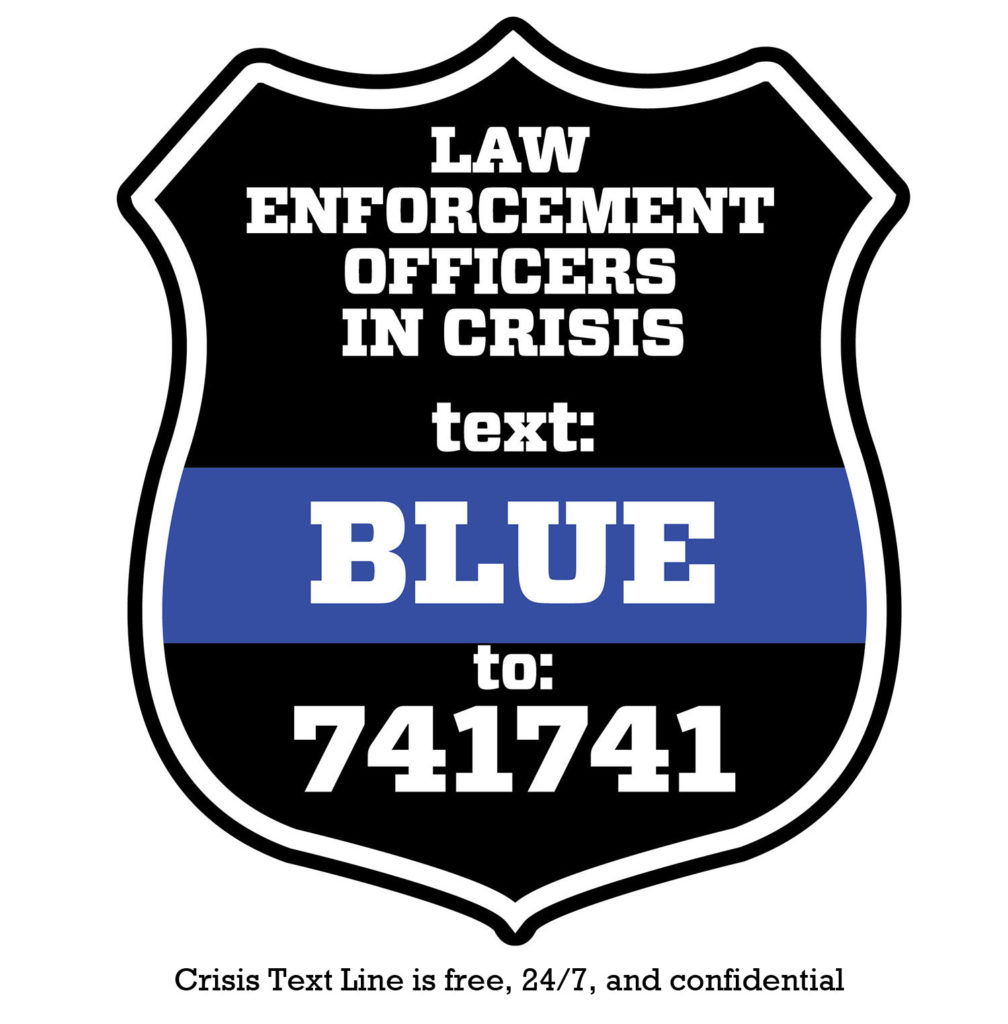Hello all,
Here's the latest edition of the newsletter. First, happy holidays to everyone. Regardless of what you celebrate (or don't), I'm sending my best to everyone.
The holidays can also though be a tough time for some - especially law enforcement personnel and others working in crisis incidents. Make sure you look after yourself. You matter.
Take a moment to check out some resources [HERE]. For example, did you know that the great organization, Crisis Text Line, has set up a special keyword specific for law enforcement officers in a personal crisis? By texting BLUE to 741741 (U.S. only), you'll be connected to a crisis counselor that will only know you are a law enforcement officer somewhere in the U.S. needing a bit of help. It's 24/7, free, and confidential.

Moving along, there's plenty of information (as usual!) in this month's newsletter. I'll update the calendar next month for 2019 trainings. I'm also working on some interesting research that can also serve as a way for your teams to stay sharp with their skills. I'll share more next month but as a preview, one study includes a terrorism element while another is regarding texting.
With us currently in the holiday season ("silly season" for my Aussie friends), part of self-care is taking the time to take care of ourselves away from the world of crisis. From that perspective, the last entry of this newsletter is a few non-HNT related books that I recommend. Yes, I have read them and that's why I'm recommending them.
As always, feel free to pass this along to anyone and let them know they can sign up too if they would like to get it.
Finally, again I wish everyone and their families a happy holidays and new year!
Thank you,
Jeff
(as always, make sure to check out www.crisisnegotiatorblog.com for stories while you wait for the next newsletter)
1. After a suicide, here’s what happens to the people left behind

Loss survivors – the close family and friends left behind after a suicide – number six to 32 for each death, according to the Centers for Disease Control and Prevention, meaning that in 2017 alone, as many as 1.5 million people unwillingly became part of this group.
They are forced to cope with the loss of a loved one and navigate uncertain futures, often caring for confused children as they struggle to accept they may never know "why."
"After his death, I cannot say that I was suicidal, but I can remember being in so much emotional pain that I would think, 'I really don’t want to wake up,'" Ruocco said. "Because you can’t figure out how to live your life with this kind of grief."
Read more [HERE].
2. Q&A: Kidnapping and extortion: Just another day at the office
Q: Do you have any special “tricks” to save kidnap victims
A: Basically, we take over the situation and do the negotiations. I don’t know if I’d call our techniques “tricks.” We try to get into the perpetrators’ minds and determine what they really want. Experience is important, as is learning the “do’s” and “don’ts,” and doing more of the “do’s.” Keeping our clients — not happy, because they won’t be happy — but satisfied, is important.
[MORE]
A: Basically, we take over the situation and do the negotiations. I don’t know if I’d call our techniques “tricks.” We try to get into the perpetrators’ minds and determine what they really want. Experience is important, as is learning the “do’s” and “don’ts,” and doing more of the “do’s.” Keeping our clients — not happy, because they won’t be happy — but satisfied, is important.
[MORE]
3. Understanding Psychosis
#Psychosis is s set of symptoms that impacts a person's thoughts and behaviors. A common experience is losing touch with reality. It can affect people of all ages, races, ethnicities, genders and cultures.
Check out this short video to learn more [HERE]
Check out this short video to learn more [HERE]
“These type of people when they suffer these mental illnesses they’re in a state of crisis,” Hart said. “It’s really important for the officers to recognize those illnesses and develop a negotiating strategy to defuse, de-escalate and negotiate.”
[MORE]
5. Manukau mall siege: Woman held hostage speaks of her horror
She said the man kept telling her quietly he didn't want to hurt her.
She said the man kept asking for his sister.
Wheeler said there were plenty of police officers facing off with the man, many who had drawn weapons.
However, only one spoke, a negotiator who Wheeler said did an "outstanding" job.
She said the negotiator told the man he could see his sister when he went back to the police station with them.
Read the full story and watch video footage at the NZ Herald [HERE].
Wheeler said there were plenty of police officers facing off with the man, many who had drawn weapons.
However, only one spoke, a negotiator who Wheeler said did an "outstanding" job.
She said the negotiator told the man he could see his sister when he went back to the police station with them.
Read the full story and watch video footage at the NZ Herald [HERE].
6. How to Control Your Emotions During a Difficult Conversation
It’s hard not to get worked up emotionally when you’re in a tense conversation. After all, a disagreement can feel like a threat. You’re afraid you’re going to have to give up something — your point of view, the way you’re used to doing something, the notion that you’re right, or maybe even power – and your body therefore ramps up for a fight by triggering the sympathetic nervous system.
This is a natural response, but the problem is that our bodies and minds aren’t particularly good at discerning between the threats presented by not getting your way on the project plan and, say, being chased down by a bear. Your heart rate and breathing rate spike, your muscles tighten, the blood in your body moves away from your organs, and you’re likely to feel uncomfortable.
[MORE]
7. 7 Traits of the Modern Sociopath and Psychopath
8. Two Signs Of A Panic Attack Coming On
Empathy is critical to being an effective negotiator and helping someone through a crisis. Learn more about what a person is experiencing, especially the physical symptoms, when they are in the midst of a panic attack via the Psy Blog:
With panic attacks, people often report that they happen spontaneously, without being cued by anything specific.
[MORE]
9. Recommended Books (Not Crisis Negotiation Related)
Part of having a self-care plan in place is being able to step away from the world of crisis. For me, reading is part of that process. As we are in the midst of the holidays, here are a few non-crisis related books that I recommend (yes, I have read them!).

